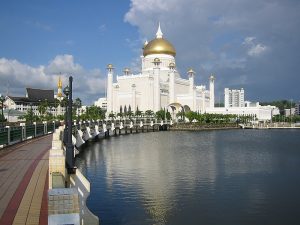
di Matteo D’Avanzo
On 3rd April Brunei introduced harsh penalties for the offences of adultery and homosexuality, triggering an intense debate all over the world. The tiny State of South-East Asia is now under the criticism and an international boycott of the royal family’s chain of hotels has started after the appeal made by many famous stars.
Brunei is ruled by the Sultan Hassanal Bolkiah, in office since 1967, who is the Head of State and Government. Islam is the official religion and Sharia law has always been applied to matters related to the personal status, that is for Muslims. The believers of other faiths are discriminated against by the State. The Christian and Buddhist communities represent, altogether, 23 % of the total population, but the Christians face the most severe forms of discrimination. It is forbidden for them to proselytise, teach religion in schools and celebrate their religious events in public. In 2014 Brunei enacted a harsher sharia law system, adopting a new penal code that includes the crimes of adultery, homosexuality, abortion, alcohol consumption and apostasy, punishable by amputation of limbs, flogging and death. In April 2019, death by stoning has been introduced for sexual crimes. The Sultan on 12th April stated that the introduction of the new penalties aims to prevent heinous crimes and protect the sanctity of the family. He also added that the decision to sentence to death the culprits shall be supported by two witnesses of moral integrity and he dismissed the allegations of adopting a draconian bill.
In the aftermath of Sultan’s statements, the introduction of death penalty has been condemned by many public figures, including U.N. Human Rights Chief Michelle Bachelet, who has warned Brunei that the revised Penal Code and the application of death by stoning breach the rules of international human rights law. Many complaints from the civil society and NGOs have begun to spread around the world and a boycott campaign has targeted the Brunei royal family’s Hotels. The Sultan Hassanal Bolkiah is, in practice, the owner of the “Brunei Investment Agency”, a sovereign wealth fund which owns the Dorchester Collection, an hotel operator which manages nine luxury hotels in Europe and the United States. The fund, founded in 1983, also manages the oil and gas incomes (about 90% of liquefied gas is being sold to Japan, according to mutually agreed terms), by making this tiny State one of the richest of the world. Many western journalists and analists believe that the wave of Islamic orthodoxy will be used by the Sultan to clean up the family’s image. Indeed, the luxurious lifestyle of the Sultan’s family, particularly that of the Sultan’s brother, Prince Jefri Bolkiah, whose harem in the ‘90s was the protagonist of “Some girls: My life in a Harem”, a book published in 2010, has been criticized by many outside commentators.
It’ s worth explaining that Islamic law has a complex set of rules which embrace three types of penalties: Hudud, Qisas and Ta’zir. The first category includes crimes that are considered by the Quran and Sunna as particularly serious (such as apostasy, adultery, theft), and should be punished by strict measures. The Qisas penalties deal with blood crimes and, according to the Koran and Sunna, provide for the law of retaliation or can be replaced by Diya (blood money), an economic compensation paid to the victims or to their heirs. The Ta’zir penalties concern minor crimes, and sanctions included lashes.
Few Muslim countries enforce the hudud penalties. The only two countries where there has been a high number of capital punishments are Iran and Saudi Arabia. Pakistani law provides for stoning to death in case of illegal sexual intercourse, but no death penalty has so far been carried out. Brunei follows the Shafi’i Islamic Law School (the second Sunni school by number of adherents), considered as one of the most conservative together with the Hanbali school (practiced in Saudi Arabia). The Sultan has also the power to appoint the State Mufti of Brunei, who has the duty to give opinions on religious and legal matters. Thus, the policies undertaken by the Head of State are intertwined with the interpretation of the sacred texts given by religious experts who happen to be State officers.
Bibliography:
- Redazione Esteri, “Brunei il sultano decide di instaurare la sharia”, Tempi, 23 ottobre 2013. https://www.tempi.it/brunei-il-sultano-decide-di-instaurare-la-sharia-previste-amputazioni-per-furto-e-lapidazione-per-adulterio/
- “Brunei says controversial Sharia law aimed at ‘prevention’”, BBC World News, 12 Aprile 2019. https://www.bbc.com/news/world-asia-47906070
- “Brunei must immediately halt plans to introduce stonings and other vicious punishments”, Amnesty International, 3 Aprile 2019.
- Miles Tom, “U.N.’s Bachelet urges Brunei not to apply death penalty for gay sex, adultery”, Reuters, 1 Aprile 2019.
https://af.reuters.com/article/worldNews/idAFKCN1RD1V6
- Barbieri G, “Brunei il Paese più ricco del mondo”, Wall Street International, 17 Febbraio 2014. https://wsimag.com/it/viaggi/7400-brunei
- Cahalan S., “My nights at the Harem”, Metro, 27 dicembre 2009.
https://nypost.com/2009/12/27/my-nights-at-the-harem/
- Madkoar S. M., “Human Rights from an Islamic Worldview. An outline of Hudud, Ta’zir & Qisas”, Al-Muhajabah’s Islamic Pages, 28 Ottobre 2014.
http://www.muhajabah.com/docstorage/hudud.htm
- Middle East and North Africa, Asia-Pacif, Freedom House.
https://freedomhouse.org/regions/middle-east-and-north-africa
https://freedomhouse.org/regions/asia-pacific
- “The four Sunni schools of Islamic Jurisprudence”, Fanack.com, 24 Settembre 2018. https://fanack.com/religions/four-sunni-schools-of-islamic-jurisprudence/
- Touzenis K. , “Appunti di diritto Musulmano”, Scritti dell’Università di Pisa, 2010.
http://web.jus.unipi.it/wp-content/uploads/2014/05/Diritto_musulmano.pdf
For further details:
- “Sharia law and death penalty”, Penal Reform International, Luglio 2015. https://cdn.penalreform.org/wp-content/uploads/2015/07/Sharia-law-and-the-death-penalty.pdf
- “Brunei Darussalam”, Department of Government Printing, Prime Minister’s Office, Brunei Darussalam, 2013.

 Tutte le ultime news dal mondo.
Tutte le ultime news dal mondo.